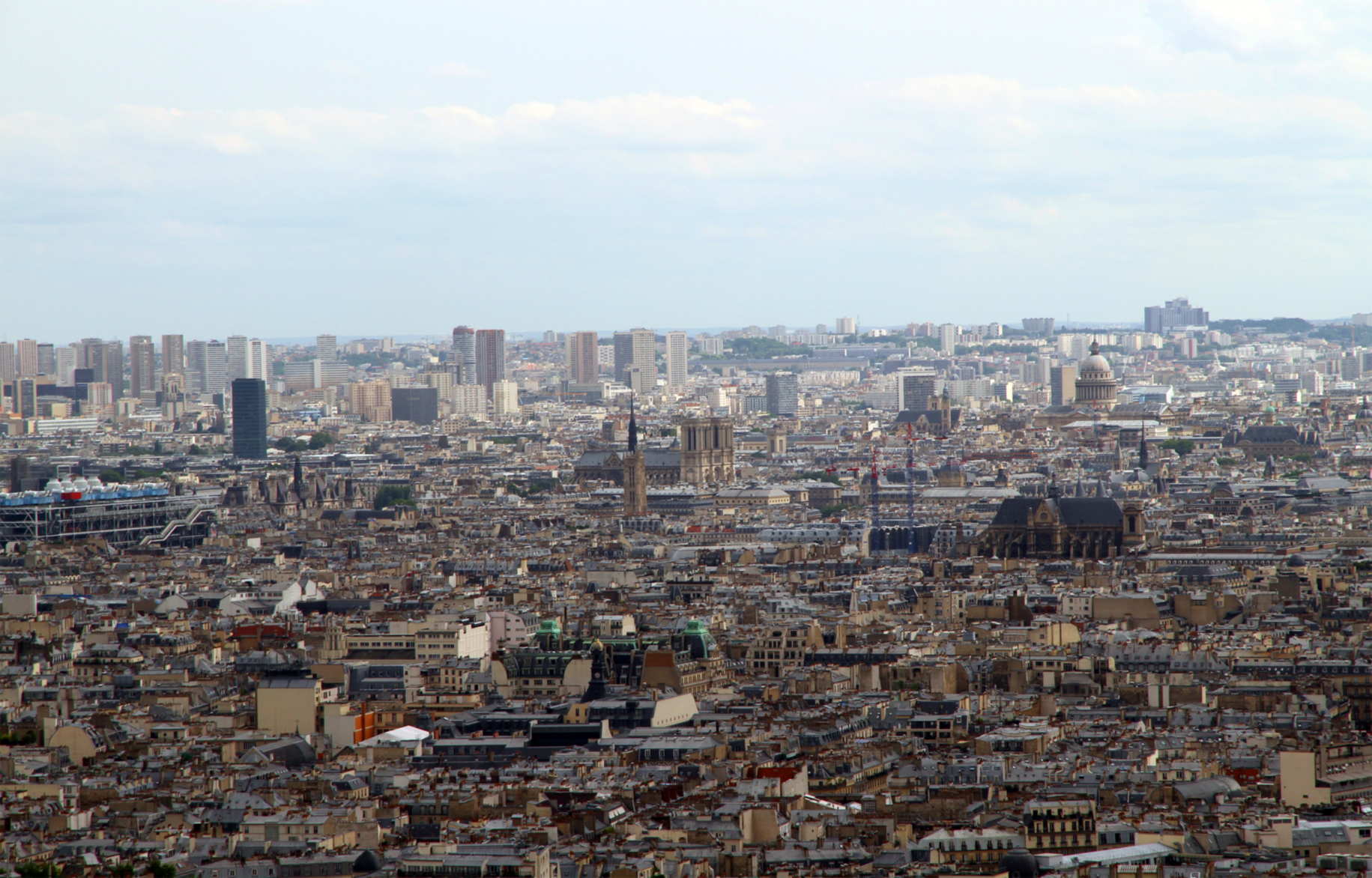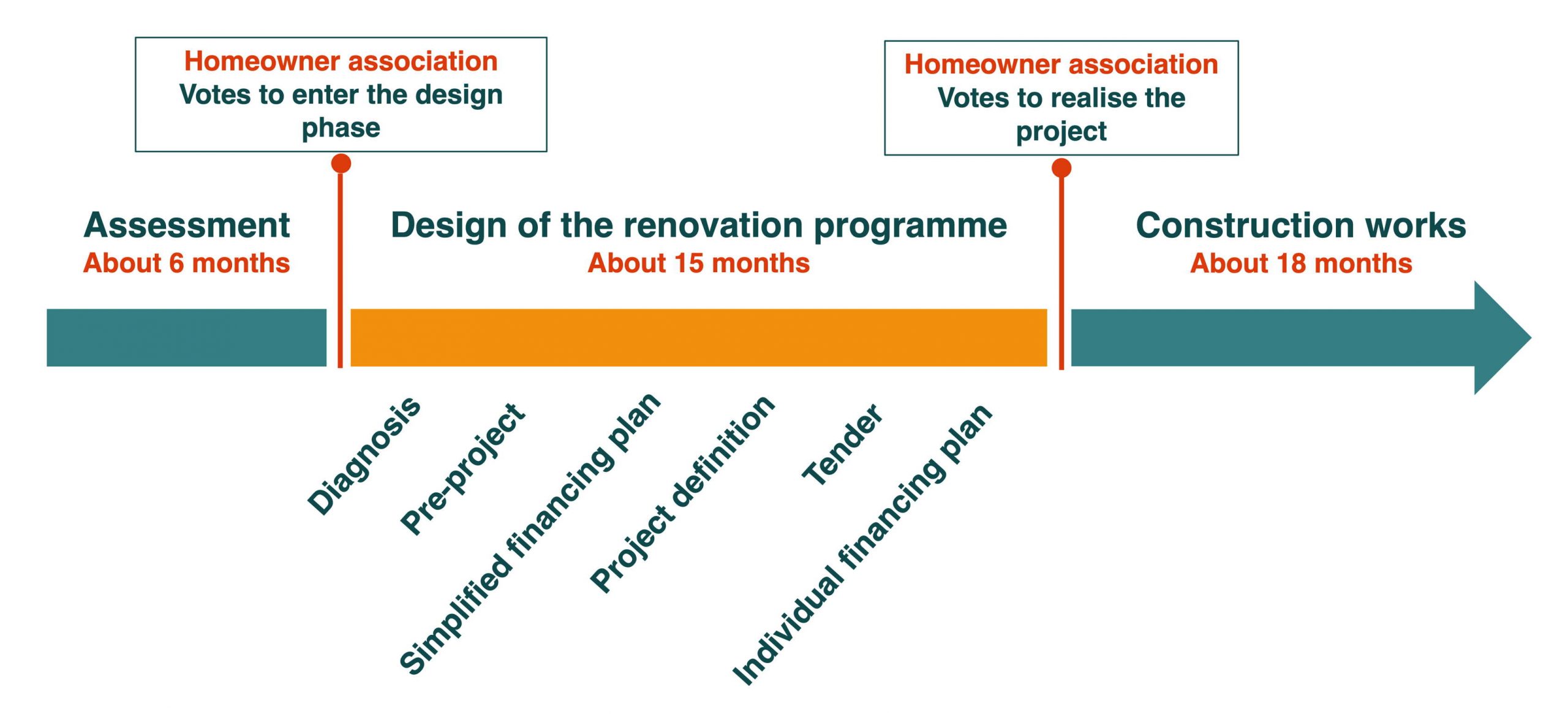
Île-de-France region includes Paris city and dense suburbs, rural areas and some other towns within a radius of 60 km around Paris. With 12 million inhabitants on 12 000 km2, it is one of the most densely populated regions in Europe. The Region counts 4.7 million homes, of which 72% are multi-family buildings. Some of these buildings belong to one company (generally social dwellings), but most of them are condominiums, i.e. they are owned by several households.
The same issues arise with the energy renovation of condominiums as with individual houses: high investments and major works carried out by non-professionals. In addition, in the condominium sector, the decision is not made by a single household, but by a group of households: 5, 50, or sometimes 500 households have to agree on a work programme that will require investments between 15 000 € and 50 000 €.
To address this sector and make deep energy renovations in condominiums possible, Île-de-France Region created Energies POSIT’IF in 2013. It became Île-de-France Energies in 2018.
Process of renovation programmes

To address this sector, Île-de-France Energies has developed an offer that combines all technical, social and financial solutions. It is based on 3 phases:
- Assessment: An analysis of the building itself and its technical equipment is conducted. Based on the renovation needs and potential energy savings, a list of works is proposed and organised in three possible “work programmes”. The first work programme is basic and only includes the maintenance of the building, the third work programme is a deep energy renovation. The costs for all these work programmes are estimated and a financial analysis is carried out.
- Design of the renovation programme: This phase consists of an update of the previous phase’s results (assessment/diagnosis). Then a pre-project is designed: an architect and an engineer map out the technical solutions for insulating the walls, roof, floor, and for the improvement of the ventilation and heating system. This pre-project is presented to the condominium owners and a detailed project is elaborated based on their feedback. Subsequently, a call for tenders is published. Île-de-France Energies analyses the offers received to be able to recommend the best value for money. In parallel, the subsidies and loans the condominium owners can benefit from are identified. On the basis of the contractors’ offers and the available subsidies and loans, a detailed financing plan is prepared. Then, a general assembly is organised where the homeowner association decides on the implementation of the measures.
- Construction works: If the general assembly approves the measures, there is a phase of loan subscription and then, the construction works can begin.
Required expertise
Different skills are required in these phases:
- Project management: IdF Energies’ project managers are the main contact points for the condominium owners. They agree on the planning, help the condominium owners to make decisions, and coordinate the other partners.
- Architecture: The architect designs the technical solutions for the building and its aesthetic appearance. Once the condominium owners’ association has approved everything, detailed specifications are drawn up so that the construction companies can submit an offer. These offers are analysed so that the condominium owners’ association can make the best choice. During the work phase an architect of IdF Energies monitors the work to ensure its quality.
- Energy: The energy adviser analyses the energy savings of the various work programmes. He also designs the technical solutions for the installations (ventilation, heating system, hot water). Once everything has been agreed upon with the condominium association, detailed specifications are drawn up so that construction companies can submit an offer. These offers are analysed so that the condominium owners’ association can make the best decision.
- Social: Communication is key in the energy renovation of condominiums. Several meetings and surveys are organised in order to gather residents’ opinion and explain all the benefits of an energy renovation of their building. There are also individual meetings with low income-households to help them obtain specific subsidies.
- Financial: In order to succeed, energy renovation projects in condominiums must get approval from owners. Therefore, they have to be convinced that the renovation project make sense, and it has to be financially feasible for all condominium owners. Therefore, a comparative analysis of the different work programmes is prepared.
Financial offer of Île-de-France Energies
IDF Energies’ financial engineering also includes concrete solutions:
- Applying for subsidies for the condominium owners
- Offering bridging loans until the subsidies are provided, so that the condominium owners can pay the contractors (subsidies are provided after the work has been completed)
- Offering a collective loan: all condominium owners can access loans regardless of their age. The energy savings are taken into account in the analysis of the household’s creditworthiness.
The financial plan not only shows the investment per apartment, but also compares a basic work programme needed anyway for the maintenance of the building to a deep renovation. Calculations also take subsidies into account and shows installment payments in case of a 15 or 20 year loan as well as “monthly expenses” when energy savings are deducted from this installment. The approach allows condominium owners to compare the impact on their monthly budget depending on whether a deep energy renovation is implemented or not.

Naturally, the size of the energy cost reduction is dependent on energy prices. Thus, an increase in energy prices can make a deep renovation even more favourable.
Success to date
113 condominiums with 16 550 apartments have requested pre-work studies from IdF Energies. Of these, 27 condominium with 3 740 apartments have implemented energy efficiency renovations or are in the process of doing so. 50 condominiums with 7 700 apartments are still in the phase of pre-work studies (assessment or design of the proposed measures). The condominium owners’ associations who decided to carry out energy renovations are saving 7 550 tons CO2 per year and 27 000 MWh of energy. The total investment amounts to 80 million €. On average, total energy consumption is reduced by 46% and greenhouse gas emissions decrease by 56%.
